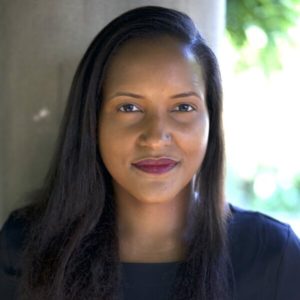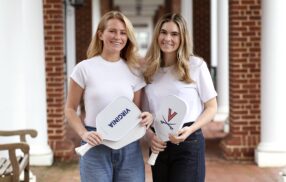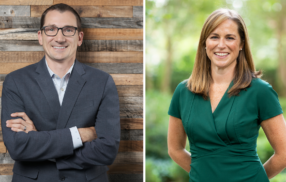
Q&A: Darden Grad Aims to Add Color to the Stock Photo Marketplace
By Whitelaw Reid
In her job as a video producer and editor at the Washington Post, Claritza Jimenez (EMBA ’21) was working on a story about student loan debt and needed photos that showed college students from racially diverse backgrounds.
Unfortunately, after an extensive search of various stock photo sites — virtual catalogs of images and videos that can be purchased to illustrate news and feature stories — she pretty much came up empty. 
“This was especially frustrating since various analyses have shown that Black college graduates carry a larger student loan debt burden than other groups,” Jimenez said. “As a journalist, it bothered me that visually I wasn’t communicating this story as accurately as I could. As a video producer, I was also working against pretty intense deadlines. So not finding the images I needed created an impediment to publishing my videos within a reasonable timeframe.”
The student debt story was far from an isolated incident. Jimenez often had a tough time finding racially diverse stock images and stock video clips to use when producing news videos.
Two years later, Jimenez — who now works as the managing producer at POLITICO — decided to take matters into her own hands.
She arrived at the Executive MBA program at the University of Virginia’s Darden School of Business with an idea for a photo licensing company that she believed could, once and for all, solve the problem.
“I basically made a promise to myself that I would pursue the idea and see how far I could take it,” Jimenez said. “I believe one of the best things I did from Day One was to openly express my interest in entrepreneurship and not hide it.
“I had never started a venture before and I think it can be intimidating to want to pursue entrepreneurship if one doesn’t have any background in it whether it be through a family-owned business or even through starting a side hustle.”
Jimenez immersed herself in the Darden world, pursuing a leadership role with the Executive MBA Entrepreneurship Club. She served as its co-president, which allowed her to become connected to Darden’s entrepreneurial ecosystem.
Jimenez’ concept was a finalist in the UVA Entrepreneurship Cup, and she had an opportunity to develop her pitch through professor Greg Fairchild’s “Entrepreneurial Thinking” course. From there, she landed a spot in Batten’s summer incubator, and, subsequently, her first client for InColorStock through professor Damon DeVito, who also invited Jimenez to participate in his “Venture Velocity” course.
“I can honestly say if it wouldn’t have been for Darden and its amazing entrepreneurship ecosystem that I would not have started my first company,” Jimenez said.
UVA Today caught up with Jimenez to learn more about InColorStock, as well as her job as managing producer at POLITICO.
Q. What is the most unique thing about InColorStock? Do you have any competitors?
A. What sets InColorStock apart is that it is the only marketplace solely focused on licensing the work of photographers and videographers from racially diverse backgrounds and that is solely dedicated to featuring stock content depicting people of color in the U.S.
Yes, there are well-known stock content sites such as Getty, Shutterstock, and UnSplash. But InColorStock is fully focused on stock images and stock videos that depict Black and other people of color in an organic and authentic manner. InColorStock’s tagline is “culturally intelligent stock content for the real world.” In many of the larger stock content sites, users often have to dig through a bunch of stock content to find the images featuring people of color.
I must say that the racial injustice movement that gained broader acknowledgment in 2020 spurred the major stock content sites to feature people of color more prominently. But this is a very recent development and there is no telling how long it will hold.
In addition, InColorStock offers a 50% licensing rate to photographers, which is among the highest rates in the market. This is intentional because I believe content creators should be fairly compensated for their work. InColorStock has some niche competitors, which I actually think is a wonderful thing. I believe there is room for other stock content sites that place an emphasis on culturally and racially diverse people. It’s good for the market for there to be more options, it’s good for us as a country for there to be more inclusive images since visuals are a powerful way to shape culture, and it’s good for photographers and videographers to have more options for where they can license their work.
Q. In terms of its development, how far along is InColorStock? Are you seeking investors? Can organizations looking for stock photos use InColorStock now? If so, how do they go about doing it?
A. InColorStock has its first collection of stock photos currently available on the site and customers can log on right now and purchase the editorial, commercial or standard licenses for these photos and download them immediately.
In addition, I am also sourcing more stock content for the site. What does this mean? I spend a lot of nights and weekends targeting photographers who have portfolios with photos that are a good fit for InColorStock. I spend hours reviewing photo portfolios on websites and on Instagram. This is actually one of my favorite parts of running InColorStock, but also the most time-consuming. It’s content acquisition and for a content-driven business, it is everything.
InColorStock is a two-sided market platform, which means I need to build two sides of the company – the stock content library and the customer base to purchase the licenses to the photos. So far, I’ve succeeded in getting three photographers signed on InColorStock, which means I get the right to license their photos. I have a long way to go, but I am encouraged that three photographers have put their trust in me to license their work.
Q. What have been the biggest challenges?
A. InColorStock is a purely digital business. There is no physical product. I can’t go to a farmers’ market to sell a beverage or do a pop-up shop and sell a clothing item. It’s all online. So, the biggest challenge is honing into a digital marketing strategy to accelerate the pace at which I acquire stock photos for licensing from photographers.
I finished my MBA in May and then in the fall I enrolled in a digital marketing course through UVA. I know! The learning continues. This digital marketing course has given me the tools to create a digital marketing strategy for identifying and reaching out to photographers.
As of now, I am doing the outreach directly and have built a workflow that allows me to reach out to at least three new photographers each week. I am learning that getting a photographer from being interested to actually signing a licensing agreement is just like acquiring a new customer to buy a product. But in this case, I am selling photographers on InColorStock as the product and this is all done online.
Q. What do you enjoy most about your fulltime job as managing producer of POLITICO Live? And how do you find enough time in the day to also run a start-up?
A. POLITICO Live is the live journalism platform for POLITICO. As managing producer, I conceive and execute all editorial content on the platform ranging from interviews with White House Press Secretary Jen Psaki to summits that feature corporate executives from Salesforce and Ikea, members of Congress, governors, mayors, and activists, and a town hall series on racial inequality.
Since the start of the COVID pandemic, I’ve spearheaded the content and execution of more than 300 live news events. My work also involves strategic collaboration with marketing, audience engagement and product teams.
My favorite part of all of my work is coaching POLITICO journalists for their interviews. It’s really an art and science to not only come up with the right questions to ask in terms of what is newsy and substantive but master how to deliver these questions to elicit what we need to know.
As far as how do I find enough time to work full-time and work on my company, I think it comes down to a combination of factors. First, I have plotted out my goals for each quarter. So for Q4 in 2021 it is all about the digital marketing strategy and there are certain key performance indicators attached to that. I pretty much know that every week I have to accomplish a set of tasks and dedicate nights and some of my weekends for this. So, having a structure helps with mitigating the stress of working full-time in the news business, which can be chaotic and also running my venture.
But of course, I have my days like anyone else when I am human and feel overwhelmed. On days like this, I have a mantra – “What’s the one thing that is doable today? Just do that one thing.” I have also connected with a lot of founders in and outside of Darden and it helps to talk to fellow founders because they get it.
Q. What are your long-term goals for the company?
A. My long-term goal for InColorStock is to build a premier destination for high-quality stock content depicting culturally and racially diverse people in the U.S. in an authentic and organic manner. When someone comes across an image featured on the site it should resonate and it doesn’t feel like we are trying to show a very superficial take on diversity. There is no tokenism.
In the short term, I’d like to get 100 photographers signed onto the platform within the next year.
This story originally appeared on UVA Today.
The University of Virginia Darden School of Business prepares responsible global leaders through unparalleled transformational learning experiences. Darden’s graduate degree programs (MBA, MSBA and Ph.D.) and Executive Education & Lifelong Learning programs offered by the Darden School Foundation set the stage for a lifetime of career advancement and impact. Darden’s top-ranked faculty, renowned for teaching excellence, inspires and shapes modern business leadership worldwide through research, thought leadership and business publishing. Darden has Grounds in Charlottesville, Virginia, and the Washington, D.C., area and a global community that includes 18,000 alumni in 90 countries. Darden was established in 1955 at the University of Virginia, a top public university founded by Thomas Jefferson in 1819 in Charlottesville, Virginia.
Press Contact
Molly Mitchell
Associate Director of Content Marketing and Social Media
Darden School of Business
University of Virginia
MitchellM@darden.virginia.edu





